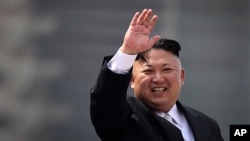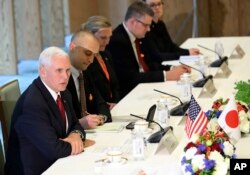The Trump administration has articulated a tougher approach toward North Korea in recent days, saying it has lost patience with Pyongyang's intransigence in the face of long-standing demands to curb its nuclear ambitions.
"Those who would challenge our resolve or readiness should know, we will defeat any attack and meet any use of conventional or nuclear weapons with an overwhelming and effective American response," Vice President Mike Pence said Wednesday aboard a U.S. aircraft carrier in Japan. That followed his comments Tuesday in Tokyo declaring the U.S. will not rest until it achieves the goal of a denuclearized Korean Peninsula. And at a stop in Seoul earlier, he said, "The era of strategic patience is over" — referring to the more muted Obama administration strategy.
Pence's visit to northeast Asia came as the president's national security adviser, Lieutenant General H.R. McMaster, told ABC News "all our options are on the table" in North Korea. However, McMaster expressed hope there would be no need for a military strike against the North.
In a pair of recent Twitter posts, President Donald Trump referred to the Pyongyang regime as a "menace" that is "looking for trouble."
Taking a broad swipe at Obama's approach, he wrote, "The first 90 days of my presidency has exposed the total failure of the last eight years of foreign policy."
Contrasts with Obama approach
Despite the barrage of harsh rhetoric, analysts from both sides of the political spectrum agree that Trump's policy remains strikingly similar to Obama's "strategic patience," and that the options for dealing with Pyongyang are limited. The main difference, they say, is in tone.
George Washington University professor Henry Nau, who served on the National Security Council staff in the Reagan administration, said the tough talk was primarily aimed at getting the attention of rogue elements in various parts of the world that have acted with impunity in the past.
"In Asia, as in Syria, Trump is sending a signal: We're back in the game. We're not going to remove the military tool from our toolkit,'" Nau said. "Obama was reluctant to use military force. So it's a contrast that serves Trump's purposes."
Christine Wormuth, former undersecretary of defense for planning in the Obama administration, described Trump's rhetoric as "flexing bigger muscles in public." But when it comes to policy choices, she said, the current administration has the same few options as Obama in confronting the erratic and unpredictable regime in Pyongyang.
"I'm in favor of a carrot-and-stick, dual pressure-and-diplomacy-track strategy, which I think is what Trump is trying to do, which again is what Obama was trying to do," Wormuth said. "And had Hillary Clinton come into office, she would have pursued the same strategy."
U.S. allies' expectations
Abraham Denmark, former deputy assistant secretary of defense for East Asia under Obama, said Washington's allies see Trump's more robust tone toward Pyongyang as a welcome shift from the previous administration's studied calm in the face of Kim Jong Un's increasingly aggressive posture.
In a VOA interview, he said "our allies want to see us react and want to see us get tougher, and not just let these things roll off our back."
"Under Kim Jong Il [the current leader's father], North Korea did conduct these provocations, to squeeze out more economic aid or things like that," Denmark said. "But I think it's become clear under Kim Jong Un, North Korea has a different approach. They seem to be genuinely seeking to develop a credible nuclear capability, which means that our strategy has to change as well."
Wormuth, who now serves as a senior adviser at the Center for Strategic and International Studies in Washington, agrees that North Korea is becoming a more serious challenge with each missile test, whether successful or failed.
"With every test, even a failed one, the North Korean scientists learn about their program," she said. "What it indicates to me is that their focus is not just on being provocative, but more about trying to further the missile program, and we have to find a way to slow that down.
"The longer they are allowed to test, the more likely they will ultimately succeed in developing an ICBM that can reach the continental United States," Wormuth said.













